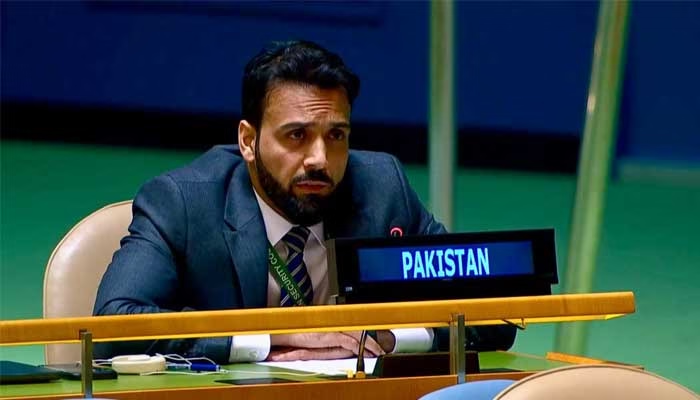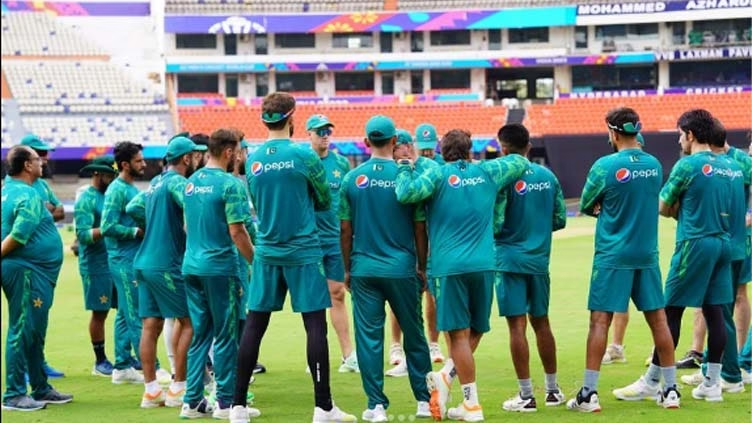Pakistan rejects India’s allegations at UNGA with a firm rebuttal that highlights Islamabad’s sacrifices, its role in combating terrorism, and its commitment to peace in the region. The United Nations General Assembly (UNGA) once again became the stage where the two South Asian neighbors clashed over issues of terrorism, regional stability, and human rights.
Pakistan Rejects India’s Allegations at UNGA: Muhammad Rashid’s Strong Reply
At the United Nations, Second Secretary Muhammad Rashid firmly stated that Pakistan rejects India’s allegations at UNGA and reminded the global community that Pakistan has lost more than 90,000 lives while fighting terrorism. Rashid highlighted that Pakistan is not only a victim of terrorism but also one of the strongest pillars leading international counterterrorism efforts.
He countered Indian Minister of External Affairs Subrahmanyam Jaishankar’s accusations by stressing that New Delhi itself has been involved in destabilizing its neighbors. According to Rashid, there are credible reports of Indian intelligence agencies supporting networks engaged in sabotage, targeted killings, and subversive operations beyond its borders.
India as a Regional Bully
In his statement, Rashid described India as a serial perpetrator of terrorism and a regional bully. He argued that New Delhi’s policies undermine South Asian peace and stability, holding the region hostage to hegemonic ambitions and radical ideologies. Such actions, he noted, inspire hatred, xenophobia, and divisions rather than fostering cooperation.
He added that intelligence operatives from India have been accused of funding groups engaged in violent operations across borders, which violates international law and raises serious questions about India’s credibility in its counterterrorism claims.
Pakistan Rejects India’s Allegations at UNGA: Condemnation of Mockery
In his second right of reply, Rashid condemned India for resorting to mockery by distorting Pakistan’s name during official discussions. He said that Pakistan rejects India’s allegations at UNGA not only on factual grounds but also because the rhetoric used by New Delhi reflects immaturity and desperation.
He emphasized that insulting a sovereign nation and its people on a global platform is not only undignified but also diminishes India’s credibility in front of the international community. According to Rashid, when a country has no substantive arguments to present, it resorts to slurs, which are unworthy of serious discourse.
Prime Minister Shehbaz Sharif’s Address at UNGA
Prime Minister Shehbaz Sharif, while addressing the United Nations General Assembly this week, reiterated that Pakistan seeks peace after successfully defending itself in the May conflict with India. He declared that Pakistan’s armed forces, under the leadership of Field Marshal Asim Munir and the Air Chief Marshal, displayed exceptional professionalism and bravery by repelling aggression.
Shehbaz Sharif stressed that Pakistan’s goal now is to win peace in the region through dialogue and cooperation. He extended a sincere offer for peace to the world community, making it clear that Pakistan wants to move forward on diplomatic and economic fronts rather than remaining stuck in hostilities.
Such language (as used by Indian delegate) reflects neither maturity nor responsibility. Instead, it exposes that India is frustrated and reveals its pettiness on the world stage. Resorting to mockery of a sovereign nation-state's name is not just undignified, it is also a… pic.twitter.com/X1OEFSEZgo
— Permanent Mission of Pakistan to the UN (@PakistanUN_NY) September 28, 2025
Pakistan’s Sacrifices in the Fight Against Terrorism
The reminder that Pakistan has sacrificed over 90,000 lives in its fight against terrorism is significant. This figure underscores the high cost Pakistan has paid to ensure regional and global security. From military operations in tribal areas to nationwide counterterrorism strategies, Pakistan has been at the forefront of battling extremist elements that not only threatened its own stability but also posed dangers to international peace.
The international community, including various global forums, has recognized Pakistan’s contributions to counterterrorism. Yet, Indian attempts to portray Pakistan as a sponsor of terrorism ignore these sacrifices and efforts. By firmly stating that Pakistan rejects India’s allegations at UNGA, Islamabad highlighted this contradiction before world leaders.
Regional Stability and the Way Forward
South Asia remains one of the most volatile regions in the world. The long-standing disputes, particularly over Jammu and Kashmir, have kept India and Pakistan in a cycle of confrontation. Rashid’s remarks at the UNGA reflected Islamabad’s position that peace cannot be achieved when one country continues to destabilize its neighbors.
For Pakistan, peace in the region depends on mutual respect, non-interference, and a genuine commitment to dialogue. Shehbaz Sharif’s speech emphasized this point, signaling that while Pakistan is prepared to defend itself militarily, it prefers a path of diplomacy and cooperation.
The strong rebuttal at the United Nations shows how Pakistan rejects India’s allegations at UNGA with evidence, statistics, and a focus on sacrifices made in the fight against terrorism. By exposing India’s own actions as destabilizing and highlighting Islamabad’s contributions to global counterterrorism, Pakistan presented a clear and firm stance.
Pakistan has expressed its willingness to seek peace through dialogue while ensuring its sovereignty and stability are not compromised. The message from New York is clear: Pakistan seeks to lead with diplomacy, but it will not allow false allegations to go unanswered.



